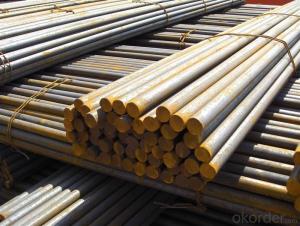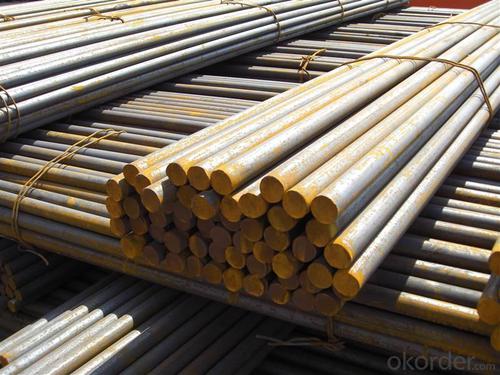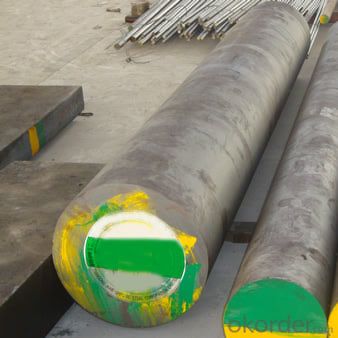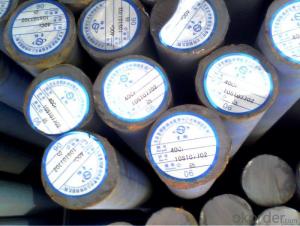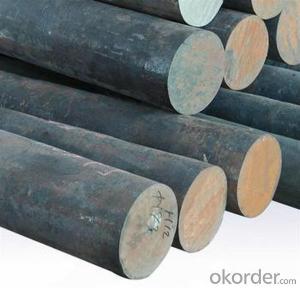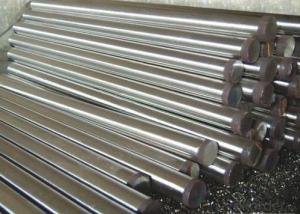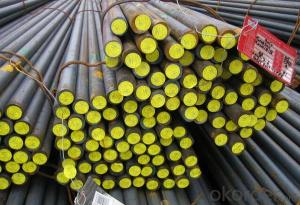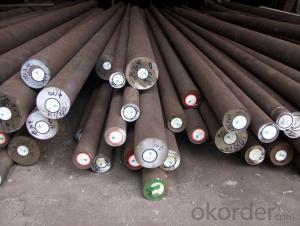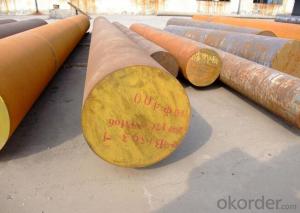Steel SKT4 Alloy Steel Round Bar Special Steel
- Loading Port:
- China main port
- Payment Terms:
- TT OR LC
- Min Order Qty:
- 25 m.t.
- Supply Capability:
- 10000 m.t./month
OKorder Service Pledge
OKorder Financial Service
You Might Also Like
Specification
Chemical Composition%
| Country | Standard | C | Si | Mn | Cr | Ni | Mo | S | P | Other |
| China(GB) | 5CrNiMo | 0.50-0.60 | ≤0.40 | 0.50-0.80 | 0.50-0.80 | 1.40-1.80 | 0.15-0.30 | ≤0.030 | ≤0.030 | - |
| USA(ASTM) | L6 | 0.65-0.75 | 0.20-0.40 | 0.55-0.65 | 0.65-0.85 | 1.25-1.75 | 0.25 | - | - | V:0.25 |
| Germany(DIN) | 1.2713 | 0.50-0.60 | 0.10-0.40 | 0.65-0.95 | 0.60-0.80 | 1.50-1.80 | 0.25-0.35 | - | - | V:0.07-0.12 |
| Japan(JIS) | SKT4 | 0.50-0.60 | ≤0.35 | 0.60-1.00 | 0.70-1.00 | 1.30-2.0 | 0.20-0.50 | ≤0.030 | ≤0.030 | - |
Available Size
| Rolled Round Bar | φ12-80mm |
| Forged Round Bar | Φ85-600mm |
Heat Treatment
| Processing | Temperature ℃ | Hardness |
| Anneal | 760-780 | 197-241HB |
| Quenching | 830-860 | 53-58HRC |
| Tempering | 490-510 | 44-47HRC |
| 520-540 | 38-42HRC | |
| 560-580 | 34-37HRC |
Characterstics
| 1.High toughness and strength | |||||||
| 2.Higher abrasion resistance | |||||||
| 3.Remaining hardness of HB300 at 500℃ | |||||||
| 4.Insensitive to tempering brittleness due to addition of Mo |
Applications: Suitable for large and medium sized forging dies with thickness of 250-350mm for automobiles,tractors,transmission gears,front axle beams and rear axles of automobiles,and forging dies for engineering machine components.
Product Show:

Workshop Show:

1, Your advantages?
professional products inquiry, products knowledge train (for agents), smooth goods delivery, excellent customer solution proposale
2, Test & Certificate?
SGS test is available, customer inspection before shipping is welcome, third party inspection is no problem
3, Payment Terms?
30% TT as deposit and 70% before delivery.
Irrevocable L/C at sight.
4, Trading Terms?
EXW, FOB, CIF, FFR, CNF
6, After-sale Service?
WE provides the services and support you need for every step of our cooperation. We're the business partner you can trust.
For any problem, please kindly contact us at any your convenient time.
We'll reply you in our first priority within 24 hours.
- Q: Can special steel be cast?
- Yes, special steel can be cast.
- Q: Can special steel be used in the telecommunications industry?
- Yes, special steel can be used in the telecommunications industry. It is often used in the construction of telecommunication towers, antennas, and transmission lines due to its high strength, corrosion resistance, and durability.
- Q: What are the different mechanical properties of special steel?
- Special steels have a variety of mechanical properties that make them unique and suitable for specific applications. Some of the key mechanical properties of special steel include high strength, excellent toughness, good wear resistance, and superior corrosion resistance. High strength is one of the most important properties of special steel. It allows the material to withstand heavy loads and stress without deformation or failure. This property makes special steel suitable for applications where structural integrity and durability are critical, such as in the construction of buildings, bridges, and machinery. Another significant mechanical property of special steel is its toughness. Toughness refers to the ability of a material to absorb energy and resist fracture under impact or sudden loads. Special steels with high toughness are essential for applications that involve dynamic and high-impact forces, such as in the manufacturing of tools, gears, and machinery components. Wear resistance is another important mechanical property of special steel. It refers to the ability of a material to resist damage and deterioration due to friction, abrasion, or erosion. Special steel with good wear resistance is commonly used in applications where it will be subjected to harsh conditions or repetitive mechanical actions, such as in the production of cutting tools, dies, and molds. Superior corrosion resistance is a valuable mechanical property of special steel, especially in environments where exposure to moisture, chemicals, or extreme temperatures is likely. Special steels with high corrosion resistance can withstand the deteriorating effects of oxidation, rust, and chemical reactions, making them suitable for applications in industries such as marine, chemical, and oil and gas. In summary, special steels possess a range of mechanical properties that set them apart from conventional steels. High strength, excellent toughness, good wear resistance, and superior corrosion resistance are some of the key mechanical properties that make special steel a preferred choice for various industrial applications.
- Q: What is the role of cobalt in special steel?
- Due to its unique properties and characteristics, cobalt plays a crucial role in special steel. It serves as a significant alloying element in the production of high-performance steel alloys, particularly those used in demanding applications where strength, hardness, and heat resistance are vital. Cobalt's primary function in special steel is to enhance its overall strength and toughness. By forming a solid solution with iron, cobalt creates a fine-grained microstructure that improves the mechanical properties of the steel. This results in increased hardness, wear resistance, and the ability to withstand high temperatures and harsh environments. Moreover, cobalt improves the steel's resistance to corrosion and oxidation, making it suitable for extreme conditions in industries like aerospace, oil and gas, and automotive. Additionally, it enhances the steel's magnetic properties, making it valuable in electrical and electronic devices. Another essential role of cobalt in special steel is its ability to facilitate the formation of stable carbides. The addition of cobalt aids in the precipitation and dispersion of carbides, contributing to the steel's high-temperature strength and excellent retention of hardness at elevated temperatures. Furthermore, cobalt assists in refining the grain structure of the steel, resulting in improved machinability and surface finish. It also allows for better control over the hardenability of the steel, determining its capacity for heat treatment and achieving desired hardness levels. To summarize, cobalt plays a multifaceted and indispensable role in special steel. It enhances the steel's strength, hardness, and toughness, improves its resistance to corrosion and oxidation, and enables it to withstand high temperatures. Cobalt also aids in refining the microstructure of the steel, enhancing machinability and allowing precise control over its hardenability.
- Q: What are the properties of maraging steel?
- Maraging steel is a type of high-strength steel known for its exceptional toughness, strength, and resistance to wear and fatigue. It possesses unique properties such as high yield strength, excellent impact resistance, and good corrosion resistance. Additionally, maraging steel exhibits good machinability, allowing it to be easily shaped and formed. This steel also has the ability to be heat treated to achieve even higher levels of strength, making it highly desirable for applications in aerospace, defense, and tooling industries.
- Q: What are the common surface treatments applied to special steel?
- Some common surface treatments applied to special steel include galvanizing, powder coating, chrome plating, and nickel plating. These treatments enhance the steel's corrosion resistance, durability, and aesthetics.
- Q: How does special steel perform in surface hardening applications?
- Special steel is known for its excellent performance in surface hardening applications. Surface hardening is a process used to increase the hardness and wear resistance of the outer layer of a metal component, while maintaining a tough and ductile core. Special steel, also known as alloy steel, is specifically designed to possess certain desirable properties, such as high strength, toughness, and resistance to corrosion and heat. When it comes to surface hardening, special steel exhibits superior characteristics compared to regular steel. Its alloying elements, such as chromium, molybdenum, and vanadium, enhance its hardenability, allowing for effective heat treatment processes like carburizing, nitriding, or induction hardening. These processes modify the surface microstructure of the steel, resulting in increased hardness and wear resistance. Special steel's ability to be hardened to a greater depth than regular steel makes it ideal for surface hardening applications. The hardened layer formed on the surface provides protection against abrasion, erosion, and fatigue, thus significantly extending the lifespan of the component. Additionally, the improved wear resistance and hardness of special steel make it suitable for applications in industries such as automotive, aerospace, and manufacturing, where components are subjected to extreme conditions and high levels of stress. Furthermore, special steel's exceptional mechanical properties make it highly durable even after surface hardening. It retains its toughness and strength, ensuring that the component can withstand heavy loads and impacts without failure. This combination of hardness and toughness is crucial for applications where both wear resistance and structural integrity are essential. In conclusion, special steel is highly effective in surface hardening applications due to its superior hardenability, wear resistance, and mechanical properties. Its ability to withstand extreme conditions and maintain its durability makes it a preferred choice for industries that require components with enhanced surface hardness and longevity.
- Q: What are the different methods of preventing hydrogen-induced cracking in special steel?
- To prevent hydrogen-induced cracking in special steel, various methods can be utilized: 1. Preheating the steel prior to welding or any high-temperature process can lower the possibility of hydrogen-induced cracking. This technique slows down the cooling rate, allowing hydrogen to dissipate before causing any cracks. 2. Employing specific heat treatment processes like stress relieving or post-weld heat treatment helps alleviate hydrogen-induced cracking. These processes decrease residual stresses and facilitate hydrogen diffusion, minimizing the risk of cracking. 3. Opting for steel alloys with higher resistance to hydrogen-induced cracking is an effective preventive measure. Certain steel compositions, such as low carbon or low alloy steels, demonstrate reduced susceptibility to cracking in the presence of hydrogen. 4. Ensuring proper control of hydrogen during welding is crucial. This can be achieved by utilizing low-hydrogen welding consumables, such as electrodes, and guaranteeing adequate shielding gas coverage to prevent atmospheric moisture from contaminating the weld. 5. Managing stress on the steel during welding or operation is essential in preventing cracking. This can be accomplished by employing appropriate welding techniques, such as avoiding excessive heat input or rapid cooling rates, and minimizing the introduction of tensile stresses during welding. 6. Applying protective coatings or surface treatments acts as a barrier against hydrogen absorption, reducing the risk of hydrogen-induced cracking. 7. Optimizing the welding parameters, including current, voltage, and travel speed, can help reduce the chances of hydrogen-induced cracking. Adjusting these parameters allows control over heat input and cooling rate, thus minimizing hydrogen absorption and subsequent cracking. It is important to note that a combination of these preventive measures is often necessary to effectively mitigate the risk of hydrogen-induced cracking in special steel. Additionally, implementing proper inspection and quality control procedures is crucial to ensure the integrity of the steel and detect any cracks or defects.
- Q: How does special steel perform in terms of wear resistance?
- Special steel is known for its exceptional wear resistance. Due to its unique composition and heat treatment, it exhibits a higher level of hardness and toughness compared to regular steel. This enables it to withstand abrasion, impact, and other forms of wear, making it highly suitable for applications where durability and longevity are crucial, such as in industrial machinery, cutting tools, and automotive components.
- Q: What are the different marine grades of special steel?
- Marine environments pose severe challenges, necessitating the use of specialized steel grades. These grades are classified based on their corrosion resistance and mechanical properties. 316 stainless steel is a widely employed marine grade. It contains higher proportions of molybdenum and nickel, enhancing its resistance to corrosion from saltwater and other harsh chemicals. This grade finds utility in marine hardware, including bolts, nuts, and screws, as well as marine structures and equipment. 2205 duplex stainless steel is another marine grade that surpasses 316 stainless steel in terms of strength and corrosion resistance. It is preferred for marine applications requiring durability and high strength, such as propeller shafts, offshore structures, and pressure vessels. 5083 aluminum-magnesium alloy is commonly employed in marine applications where weight is a concern. This special steel grade offers exceptional corrosion resistance and strength, making it suitable for boat hulls, superstructures, and lightweight marine components. Moreover, a range of high-strength low-alloy (HSLA) steels are utilized in marine applications. These steels are specifically engineered to deliver superior strength, toughness, and corrosion resistance. They find widespread use in shipbuilding, offshore drilling rigs, and other marine structures that demand durability and strength. In conclusion, the diverse marine grades of special steel present a wide array of options for various marine applications. The selection of a particular grade depends on project-specific requirements, including corrosion resistance, strength, and weight considerations.
Send your message to us
Steel SKT4 Alloy Steel Round Bar Special Steel
- Loading Port:
- China main port
- Payment Terms:
- TT OR LC
- Min Order Qty:
- 25 m.t.
- Supply Capability:
- 10000 m.t./month
OKorder Service Pledge
OKorder Financial Service
Similar products
Hot products
Hot Searches
Related keywords
